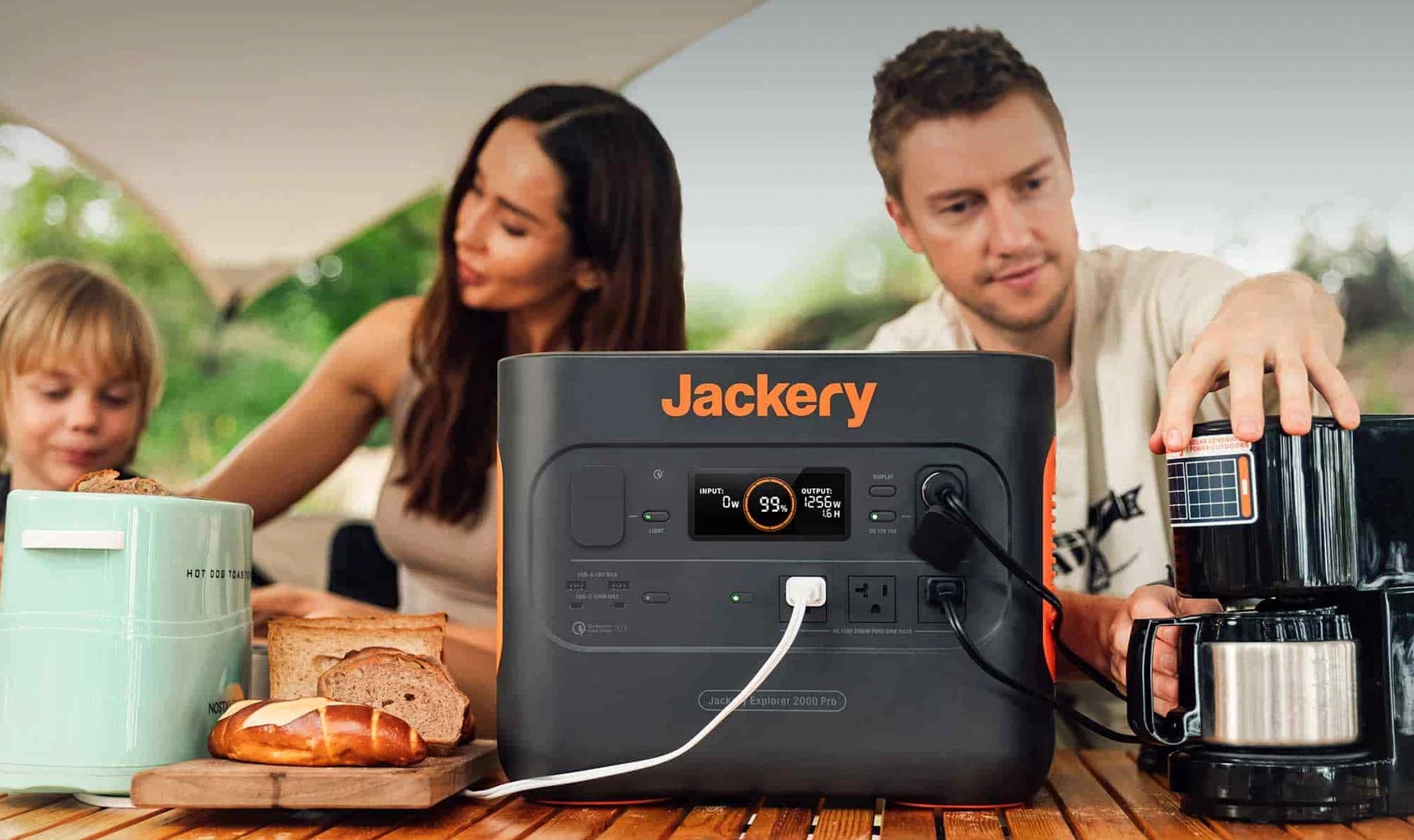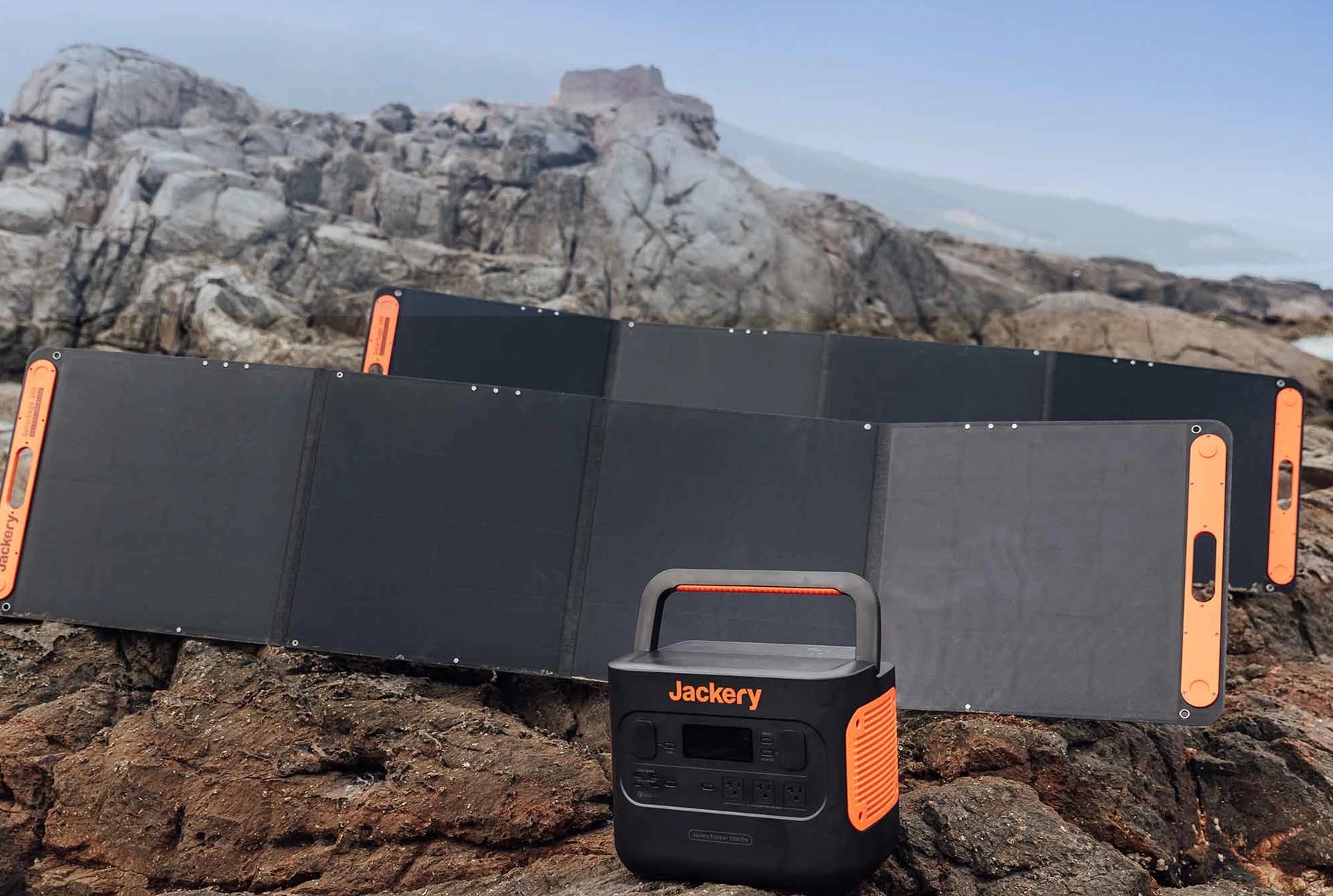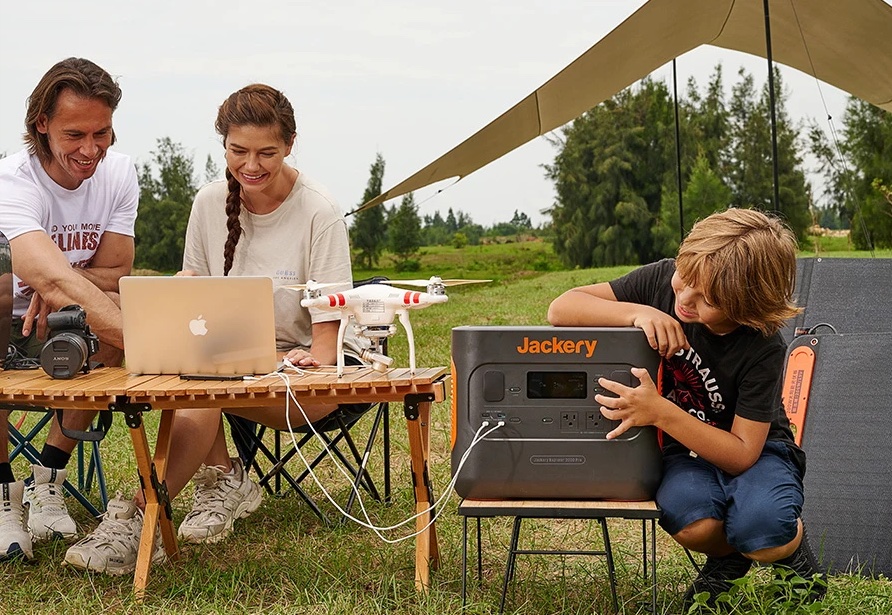Review: Jackery Explorer 2000 Pro – Portable Power Refined

Sponsored by Jackery
Jackery Explorer 2000 Pro Loaded With Updates, Improvements, and Power
Having reviewed the Jackery 1500 over a year ago in this article, I initially passed on the opportunity to review the Jackery Explorer 2000 Pro. In my mind I thought, well…bigger and more powerful, what else is there to say? Turns out I was quite wrong. The Explorer 2000 is both of those things, but with a host of refinements that make it clear Jackery has listened to their customers, and they convinced me to check out the latest model.
The naming conventions that Jackery uses are interesting. By itself, the 2000 Pro is called the Jackery Explorer 2000 Pro Portable Power Station. However, when paired with the SolarSaga 200W solar panels, it becomes the Jackery Solar Generator 2000 Pro. Either result is a powerful alternative to gasoline-powered small generators.
The use cases for the Jackery Explorer 2000 Pro are all over the map. For those that are tent camping or have small travel trailers, this power unit packs the same punch as the ever popular Honda EU2000 gasoline generator, offering the same 2200-watt power. The obvious difference here is that you will charge up the Jackery 2000 via its AC/DC/solar sources for use, rather than carrying and using gasoline. For those with larger RVs, the 2000 is a great supplemental power source.
Jackery Explorer 2000 Pro – By the numbers
The power
The Jackery Explorer 2000 Pro provides 2160Wh (43.2V 50Ah) through its lithium-ion powered battery, monitored and managed by a 2-chip battery management system. As mentioned, it sports 2200W (4400W Peak) of power AC power at 120V. The two USB-A Quick Charge 3.0 ports offer 18W Max, while the two USB-C ports offer their standard fare of 100W Max, (5V, 9V, 12V, 15V, 20V up to 5A). A 12V, 10A car output (think cigarette lighter, if you remember those) is available as well.
The weight
The Jackery Explorer 2000 Pro weighs a hefty 43 lbs. That’s a couple of pounds less than the Honda gas generator we cited earlier and about 8 lbs greater than its predecessor, the Explorer 1500. Interestingly, as we’ll see in a few moments, the comparison to the 1500 doesn’t quite do it justice, as it is almost the same size as the 1500, yet with a much smarter and more efficient form factor.
The battery
As noted, the Jackery Explorer 2000 Pro is powered by a lithium-ion battery. The first-rate lithium battery houses two computer chips for dual-battery protection and four temperature core detectors. The battery can be charged via AC power in just 2 hours, and of course via the Solar Saga panels in times ranging from 2.5 hours to 7.5 hours, depending on whether you have 2,4, or 6 of the 200W panels. DC charging takes about 24 hours.
Of interest to most of course is, how long does it last! I’ll note my personal testing below, but here are a few common examples that RVers can expect from the Jackery Explorer 2000 Pro. I’ve broken them down into long term uses and short term uses, based on how I see these items being used. Some of the numbers provided by Jackery are continuous use numbers; for example, a 1160W microwave can run 96 minutes, but unless you are cooking a Thanksgiving turkey, you won’t use a microwave for that long in a single stretch…probably ever.
In the tables below, the time element represents how long the Jackery Explorer 2000 Pro would last on a single charge if dedicated to that task.
Long term uses for the Jackery Explorer 2000 Pro:
- Starlink Router/Dish (90W) – 15 Hours
- Laptop (50W) – 30 Hours
- 32-inch TV (50W) – 30 Hours
- Coffee Maker (550W) – 3 Hours
- Electric Cooler (90W) – 15 Hours
- iPhone Charging (20W) – 75 Hours
Short term uses for the Jackery Explorer 2000 Pro:
- Microwave oven (1160W) – 96 minutes
- Portable air conditioner (1400W) – 88 minutes
- Electric Grill (1600W ) – 65 minutes
Of course, some things like RV coffee makers are subjective. A Keurig might use 1500W initially when heating and 200W-400W to brew after that, then sit for hours at 60W until needed again. A residential refrigerator might use 550W and be good for 3 hours, whereas the small absorption refrigerator in your camper might use half of that, or less.

Improved shape and additional features
I was most pleased and surprised by the form factor changes with the Jackery Explorer 2000 Pro. To begin with, they got rid of the fixed handle present in the 1500 and other models. Now, instead of an effectively useless space, the fold-down handle yields a wonderfully positioned flat space to lay those phones and tablets that you are charging with the 2000.
We said it was 8 lbs heavier as compared to the Jackery 1500; however, dimensionally it’s only 1-inch longer, and the height and width are basically the same. Here again, the use of vertical space and the change in the handle have made a huge difference.
Another smart change was to move the power inputs to the back of the unit. This not only makes it easier to see and manage your connections on the front, it’s less confusing. Jackery (thankfully) also got rid of the giant power brick for the AC power input. You now only need to plug in the easy-to-identify Jackery-orange standard power cord directly into the unit.
That input, like most of the open orifices on the Jackery Explorer 2000 Pro, is protected by an attached rubber guard to keep water out. A similar cap also covers the built-in, brighter LED light, which has been moved to the front of the unit, where it belongs.
One thing the 2000 shares with the 1500 is the attention to detail; it’s the little things that speak of thoughtfulness and quality. As mentioned, the cables, with branded velcro organizers, are outfitted in Jackery-orange, to easily identify them for use with the Jackery Explorer 2000 Pro. This seems like a small touch, but when you pack up everything for a camping trip, it’s easy to get cables mixed up. The packaging is very Apple-esque, almost warranting an unboxing video.
Jackery 200W Solar Saga Panels
I saw some of that attention to detail spill over into the solar panels too. The 200W SolarSaga Solar Panels are more rigid than the 100W panels I previously reviewed. That rigidity includes a full extra pair of panels built in, creating a four-panel expanding set. Each set of SolarSaga 200W panels comes in its own chique carrying case, with the requisite orange connection cable. These panels take up about the same amount of storage space as their 100W counterparts when folded.

Jackery Explorer 2000 Pro Testing
Having used and reviewed the Jackery Solar Power Generators before, I already knew what they were capable of. I’ve powered TVs, laptops, phones, and tablets with the Jackery Power Stations, with great success in the past. In all of those uses, my time or need always ran out before the battery in the Jackery did. Sure, I could power a few random devices with the Explorer 2000 as a test, but this time, however, I wanted to do a bit more…I really wanted to push this unit to its limits.
The Texas heat gave me a great opportunity to see what the Jackery Explorer 2000 Pro could do, and I wanted to hammer this thing with a full power draw. I rolled a Toshiba portable air conditioning unit that draws 1400 watts out into the 100-degree heat. I plugged the AC unit into the Jackery 2000, and just let it run.
As it was outside, there was no danger of it ever getting cool enough to shut down or even back off the power. The result was a non-stop run at 1400 watts for a full 88-minutes. During this time, the Jackery also had its own internal fan running, to keep its internal battery cool. We were operating just barely under the 104 degree recommended limit stated by Jackery. It was hot outside.
The resulting time and power draw fit comfortably within the stated use metrics that Jackery claimed. In other words, the Jackery Explorer 2000 Pro performed as expected, as claimed, even under near-extreme conditions. Campers and RVers will use the Jackery 2000 Pro in a variety of ways. The above scenario isn’t practical, nor is it a real-world scenario RVers might find themselves creating, so let’s look at some that are.
How RVers might use the Explorer 2000
Supplementing existing power
Depending on whether you are boondocking or already hooked up to 50-amp power, the Jackery Explorer 2000 Pro can provide all the power you need or supplement your power needs. Boondockers will obviously lean on a portable power pack such as this for many creature comforts, while those with plenty of available power may simply use the 2000 Pro for a variety of other power uses. In either case, with its own self-contained power, with or without the SolarSaga solar panels, you’ll have an additional, flexible power source to supplement your existing battery, solar, and electrical sources.
Keeping cool
In keeping with the air-conditioning theme for a moment, a more practical use for the Jackery Explorer 2000 Pro might be to power a small portable air conditioner or fan to take the edge off those hot summer nights so you can sleep better in your RV. Of course, in the confines of a small camper or a single bedroom in a large RV, short-term usage to cool that small space will be all that is needed, so you won’t be draining the 2000’s reserves right away.
In the evening, that same fan might serve well to keep the campfire smoke moving in a favorable direction, as well as keeping some of the mosquitoes at bay. The near-silent operation of the Jackery 2000 means you won’t be disturbing other campers when it gets late, after traditional “generator hours” have passed.
Making remote work even more remote
We think of remote work as working from anywhere on the road, in an RV. But when there is a lake, or a stream, or a mountain outside your RV door, the Jackery Explorer 2000 Pro lets you take remote work to the next level. You can fire up that laptop outside on the picnic table, or next to the stream. With the kind of power the 2000 generates, you can keep your phone and tablet charged as well. Content Creators will love the Explorer 2000 to keep cameras and lighting running while filming those great shots in remote areas.

Emergency power
Should something happen to the power pedestal at your campground during off-hours, or your RV is in need of some kind of emergency power, the Jackery 2000 will be enough to power lights, water-pump, and other items for an extended period. Maybe you are really interested in giving dry camping a try, but want a little insurance power at the ready in case things don’t go as expected. The Jackery Explorer 2000 Pro fits that bill. Those that rely on a CPAP machine will appreciate having emergency power available as well.
Kid entertainment
Kids will be kids, and sometimes that means TV or video games. If you need a way to get them settled somewhere with enough power to keep them happy and/or quiet for a couple of hours, the 2000 Pro would serve you well.
Charging
Of course, charging our phones, tablets, flashlights, 2-way radios, TPMS monitors, laptops, and everything else under the sun suits the Jackery Explorer 2000 Pro perfectly. With 3 AC ports, two USB-A, two USB-C, and a 12v car port…you should be able to charge anything.
California ban
With the move to ban generators and other small engines in California, a ready alternative is needed. The Jackery 2000 is one such alternative.
The gasoline elephant in the room
When we think of the word “generator”, particularly in the RV realm, we think of a device that can generate electricity on its own, typically using gasoline or diesel fuel. Portable generators, like the Honda EU2000 we have mentioned, do just that.
If we throw out the price of gas from the equation, a gasoline generator does a great job of creating power from fuel. The downside of course is that you have to have fuel available and carry it with you. There is the additional noise created by the engine, and that noise is often regulated by the aforementioned allowed generator hours. Then there is the exhaust management. You must contend with the engine exhaust emissions created by the generator.
With the Jackery Explorer 2000 Pro, much of that downside is mitigated. We still must remember that when charging the 2000 Pro with an AC input, that power still originates from somewhere, where some of those unpleasantries may still exist. EV power isn’t complete magic, fossil fuel is still burning…somewhere, just not at your campsite.
Still, where a gas-powered generator must run at all times to generate power, the Jackery unit contains that power, only needing a periodic recharge. For those blessed with sunny skies, that power can come from the RV industry’s favorite darling…solar power.
The long-lasting power emitted from the 2000 is silent, save for the small internal fan that runs occasionally. It’s mess free, and there is no fuel or oil to contend with. For those idyllic early mornings and late evenings when camping, you can have your power and the quiet bliss of your natural surroundings.
Jackery promotions and summer trip discounts
Jackery has geared up for summer, hoping to get you geared up for summer! Learn even more about Jackery on the Summer Trip page, and get ready to save 30% on some Jackery models. If you have 52 seconds to spare, there’s a catchy video showing the Jackery products used in typical camping lifestyle scenarios. Check out the additional information links below, including the Explorer 300 and the 100w solar panels. Jackery has a wide variety to suit many different needs.
Conclusion
To be fair, not all traditional internal combustion engine generators can be replaced with a solar-powered generator/battery pack solution, but many of those used by campers and RVers can. With the deluge of these products hitting the market, Jackery, with their built-in 2 & 3-year upgradable warranties, high quality, and well thought out products, continues to lead the charge in this space.
There are many options and combinations to choose from, so for complete pricing, head over to the Jackery website. If the Jackery Explorer 2000 Pro is more power than you need, check out the Explorer 1500, or the Explorer 1000.
The post Review: Jackery Explorer 2000 Pro – Portable Power Refined appeared first on RV LIFE.
